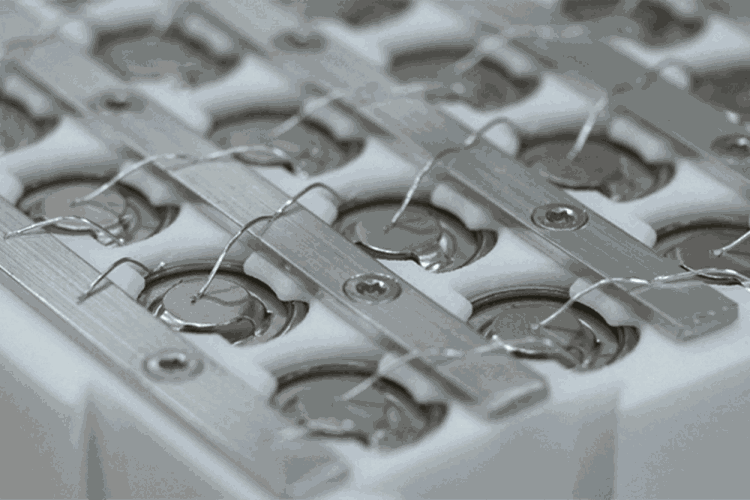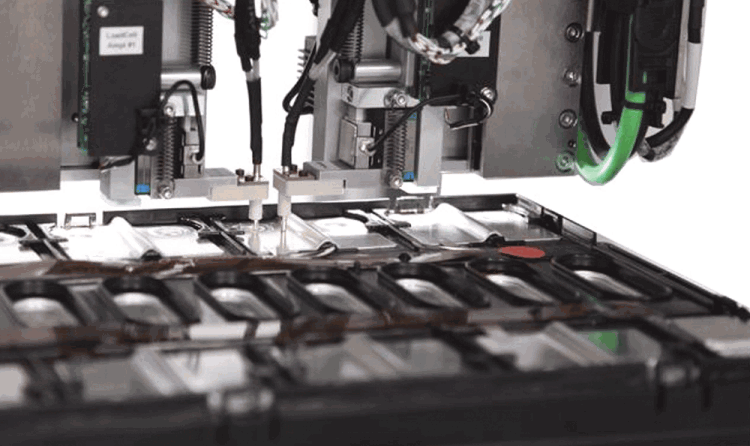
In the world of battery manufacturing, where the quality is mandatory to prevent failures and ensure optimal battery performance, electrical testing is a fundamental building block in various applications, including electric vehicles, energy storage systems, and portable electronics.
While numerous enhancements have been made to ensure proper electrical connections between the battery systems, manufacturers have recently shifted their attention to improving the quality of welding.
In the battery manufacturing process, welds are utilised at multiple stages for joining purposes. Welding defects that affect electrical circuits are particularly critical because they could prevent a battery system from performing at full capacity, reduce battery efficiency and even compromise battery safety.
Electrical vehicle (EV) batteries and battery energy storage systems (BESS) are composed of interconnected battery cells and modules. Different materials, configurations, and welding techniques are employed based on the specific design and requirements of the battery system, resulting in a diversity of characteristics. This diversity contributes to significant discrepancies in the integrity of the joints. Additionally, the requirement for high-volume production, which involves a substantial number of welds for electrical connections, increases the overall incidence of welding defects.
Welding defects can lead to a substantial decline in the overall battery performance used in electric vehicles (EV) and battery energy storage systems (BESS), resulting in various complications, including:
• Increased resistance: A poorly formed or contaminated weld can increase the electrical resistance, leading to energy loss and potentially causing overheating.
• Poor contact: A defective weld may not provide a secure connection between the battery cells or terminals, resulting in intermittent or unreliable electrical contact.
• Overheating: Increased resistance and poor contact can lead to overheating, which can damage the battery cells, cause thermal runaway, or even lead to a fire.

Electrical testing to ensure battery systems welding quality
To ensure the reliability of the electrical connections, it is essential to inspect welds and conduct electrical testing to identify and address any welding defects. Here, testing procedures primarily focus on electrical resistance testing. Accurate measurement of the electrical micro-resistance at the welded electrical connection joints is crucial for ensuring the reliability of the electrical system and preventing any adverse effects on battery efficiency. Ideally, these joints should have very low resistance to allow smooth current flow. An increase in resistance indicates a problem with the weld, suggesting that the battery may not perform optimally.
Various other important tests are utilised to ensure detection of poor welding and these include the following.
DC/AC internal resistance (IR) test
Both DC and AC IR testing measure the internal resistance of the battery. Higher internal resistance often indicates poor welding quality, which can lead to reduced charge and discharge efficiency.
Open circuit voltage (OCV) test
The OCV test is another critical assessment which ensures that the battery delivers the correct voltage as per its design specifications. If the welding quality is poor, it can cause fluctuations in the voltage output, reducing the battery’s ability to maintain stable performance. This test helps ensure that the battery operates within safe and efficient voltage limits.
The specific application of the battery system, whether used in electric vehicles (EV) or battery energy storage systems (BESS), along with the production volumes, require a tailored electrical testing approach to ensure both battery performance and safety.
Challenges in conducting testing within a high-volume production environment
The growing demand for electrification compels manufacturers to produce more batteries at a faster rate, leading to a significant volume of welds requiring testing. Ensuring electrical connections functionality and uniform welding quality in high-volume battery manufacturing environments presents considerable testing challenges, including:
• Extended timeframes: performing comprehensive weld inspection can be slow and lead to inefficient production.
• Complexity: the welding processes involve different parameters, and operators need to possess expertise in managing multiple parameters and correlate the testing results.
• Inconsistency: variations in operator skill, experience, and fatigue can lead to variabilities.
• Imprecision: the difficulty of accessing increasingly small welds and measuring extremely small resistance values, on the order of micro-ohms, can lead to imprecise results.
Addressing these challenges requires a combination of advanced testing equipment and continuous improvement in end-of-line testing.
Automatic test equipment (ATE) addresses these challenges
The use of automatic test equipment is favoured to address challenges related to efficiency, complexity, consistency, and accuracy, thereby ensuring optimal battery performance.

SPEA T100BT automatic battery tester is designed to meet the rigorous demands of battery manufacturing. With the ability to measure multiple test points simultaneously, the tester features dedicated modules that can perform multiple resistance measurements with Kelvin probes, multiplexers, and high-precision instruments. Additionally, the integration of a visual camera and thermal sensors guarantees improved testing with several key benefits, including:
• Cost efficiency: the modular testing architecture ensures broader applicability and easy reconfiguration to battery systems.
• Enhanced operations: using an integrated flying probe architecture, this automatic tester can perform an extensive array of electrical tests on one platform. Operating around the clock without the need for operators, it identifies all potential weld defects to assist in the development of the welding process.
• Data accuracy: a self-loading test program executes a consistent electrical testing sequence, thereby eliminating any variabilities that may arise from incorrect input.
• Repeatability: the advanced linear motion technology combined with sub-micron resolution linear optical encoders and a compact kelvin probe design guarantees fast moving and accurate positioning of the testing probes.
• Precise measurement: the µΩ-meter developed by SPEA specifically for this tester is fully integrated and allows rapid and accurate detection of any variations, even as small as a few microOhms, resulting in significantly shorter test time and higher precision in defect detection.
Recognising the importance of preventing failures occurring during welding, the SPEA T100BT automatic battery tester meets the demands for throughput, accuracy, and flexibility, enhancing measurement precision and data management, while simultaneously reducing the operational costs associated with electrical testing for battery systems.
| Tel: | +27 11 869 0049 |
| Email: | [email protected] |
| www: | www.mykaytronics.co.za |
| Articles: | More information and articles about MyKay Tronics |

© Technews Publishing (Pty) Ltd | All Rights Reserved